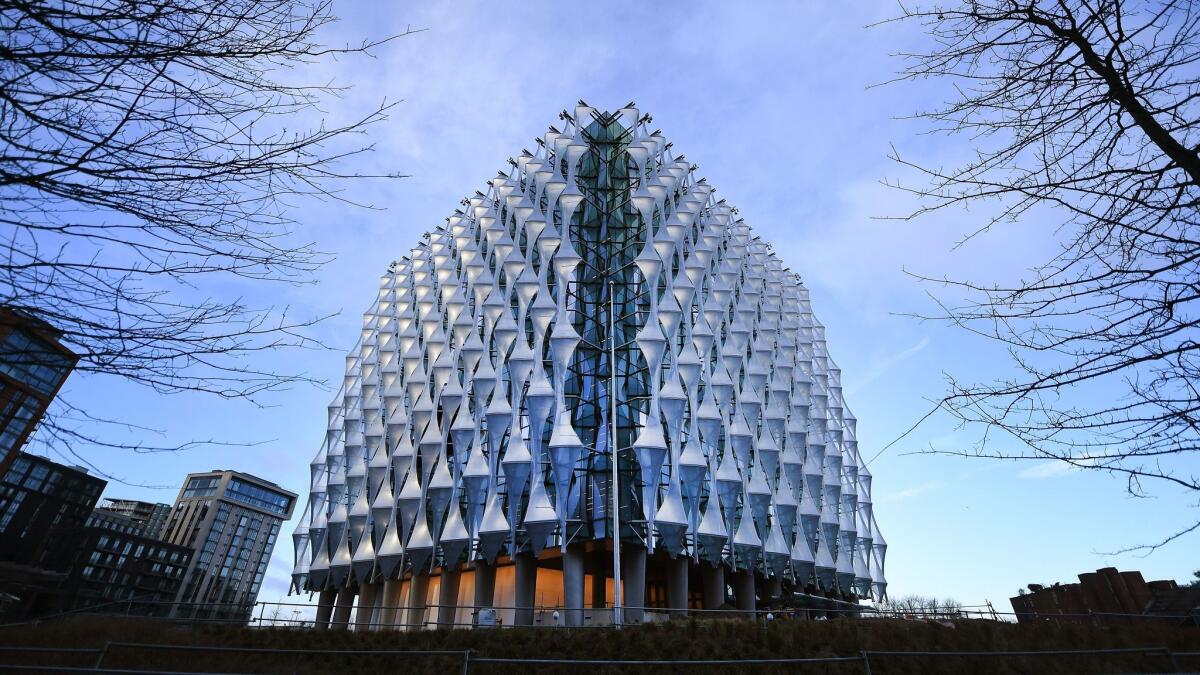One of the most expensive U.S. embassies ever built is set to open next month in London

- Share via
Reporting from London — It looms large over the River Thames, with its cubic design and plethora of environmentally friendly features.
The shiny new U.S. Embassy in London — an imposing 12-story structure — is set to open next month.
Years in the planning, the embassy comes with a hefty price tag.
The budget for the entire project, including site, development, design and construction, cost approximately $1 billion, making it one of the most expensive U.S. embassies ever built.
Compounds in Kabul, Afghanistan, and Baghdad cost more, but those embassies require far more elaborate security operations than London.
Until Jan. 16, Grosvenor Square in the ultra-posh Mayfair neighborhood will remain home to the U.S. mission, its location since 1960, but residents there are unlikely to be sad to see it go.
Since 9/11, it has become a heavily protected compound of its own surrounded by imposing steel fences, concrete barriers and guard boxes amid fears that the building was a terrorist target.
It became impossible to approach on foot without going through an elaborate system of checkpoints, and neighbors said it was a blight on their area, driving down the price of their multi million-dollar properties.
Yet the fact that the embassy is changing location but remains in a city that has been marred by a series of Islamist-inspired terrorist attacks in the past year means that maintaining the building’s security was always a paramount concern.
In 2011, Congress ruled that all U.S. embassies must sit behind a 100-foot “seclusion zone” in order to protect staff and visitors.
A key element of the brief was therefore to create a building that incorporated security needs into the architecture in a way that was not “overt and intrusive,” said James Timberlake, partner at the Philadelphia-based architecture firm KieranTimberlake, which won the bid to design the embassy.
So instead of the foreboding perimeter fence that became synonymous with the old embassy, security bollards are now camouflaged by plants and hedges, and a semicircular pond protects the entrance.
The British press has repeatedly dubbed it a moat protecting a fortress but Timberlake was quick to shoot that down.
“Moats go all the way around,” he explained. “The water in this case is only in front of the building, incorporated into a public park, which is publicly accessible.”
And, he argues, there is greater significance to the water feature.
“If the United States looks ‘across the pond’ to the U.K., in this particular case the embassy looks across the pond to London,” he said. “There’s symbolic meaning there. It’s part of the symbolism of the special relationship, it’s very much part of a gift than a defensive mechanism.”
The State Department said it proved simply too expensive to renovate the old embassy to the standards required so the new location was chosen, in part, because it was a blank canvas.
Situated in a former industrial zone surrounding the iconic Battersea Power Station, old warehouses have been bulldozed to make way for a new hub with residences, shops, a hotel and park space.
The London Underground line is also being extended to accommodate the extra traffic.
And it is an area already accustomed to a heightened police presence — British intelligence headquarters MI6 is a short walk away in Vauxhall.
The project has been financed without taxpayer money, thanks to the sale of other U.S. government properties in London, including the Grosvenor Square embassy site, which was bought by the Qatari royal family to be turned into a luxury hotel.
The result is a building that attains the highest environmental standards — it goes beyond the Leadership in Energy and Environmental Design gold excellence ratings — and comes complete with solar panels, rainwater retention and daylight-responsive lighting.
Inside, flexible, open working spaces have sweeping views across the river toward the Houses of Parliament.
During a recent press viewing of the new digs, Ambassador William Moser said he was looking forward to welcoming President Trump to the building “when he can make it,” but it was unclear when that would be.
Prime Minister Theresa May invited Trump to Britain for a state visit hosted by Queen Elizabeth II shortly after his inauguration last year.
But planning has ground to a halt after a series of spats between Trump and British elected officials, including May, threats by the public to protest the visit and calls from lawmakers for him to be banned from the country.
The architects hope that it will become a much-admired city icon for generations to come.
“If you consider the building to be a modest amount of Washington, D.C., in London, it’s Potomac on the Thames,” said Timberlake. “I think this building will hold up in second glances and third glances. People will look back in 60 or even 100 years from now and say this is a spectacular building.”
Boyle is a special correspondent.
More to Read
Sign up for Essential California
The most important California stories and recommendations in your inbox every morning.
You may occasionally receive promotional content from the Los Angeles Times.








